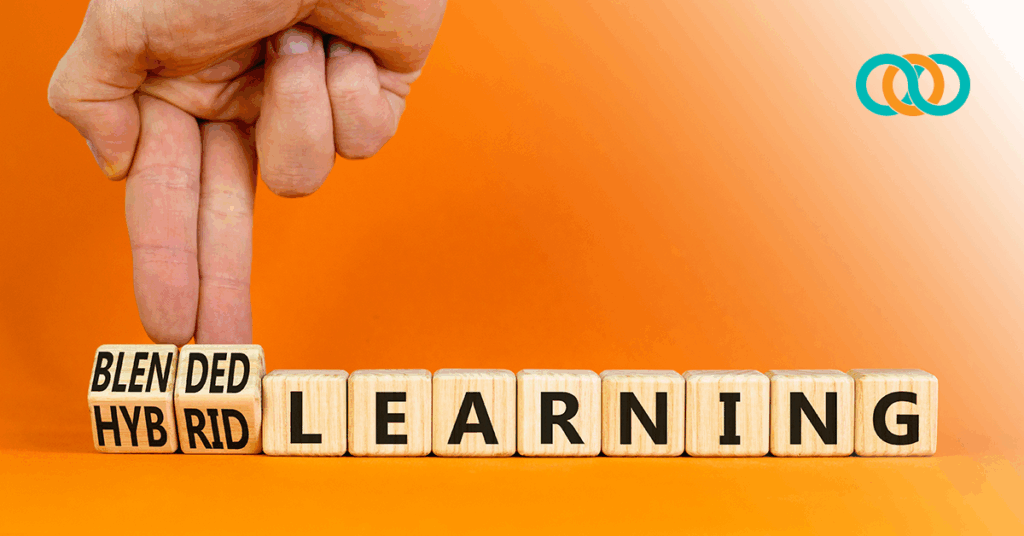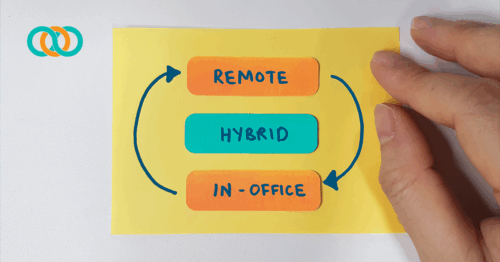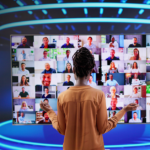If you’ve spent any time in corporate training over the last few years, you’ve heard a lot of buzz about blended learning and hybrid learning. Sometimes the terms get tossed around as if they mean the same thing, but they don’t. Blended learning is a mix of digital and in-person experiences spread out over time. Hybrid learning is when some participants are in the room while others join remotely at the same time. Both are here to stay, and both come with challenges.
That’s where Learning Experience Design (LXD) comes in. LXD takes a holistic view of the learner’s journey, focusing not just on delivering content but on crafting meaningful, engaging, and seamless learning experiences. Through this lens, blended and hybrid learning can move from disjointed to truly connected.
Why LXD Matters in Blended & Hybrid Learning
Traditional instructional design has often focused on learning or performance outcomes. Valuable, yes, but not always enough. Learners today expect experiences that are fluid, intuitive, and learner-centered.
Without a deliberate design approach, blended and hybrid learning can feel clunky. Remote learners may feel like second-class citizens, and transitions between self-paced eLearning and live workshops can be jarring.
By applying LXD principles, organizations can align digital and face-to-face elements into a cohesive experience, where learners know why they’re doing each step, how it connects to the bigger picture, and what’s expected of them afterward.
Core Principles of LXD for Blended & Hybrid Learning
Here are four design practices that make all the difference:
1. Learner-Centered Design
Start with learner personas. What’s their work environment like? Do they learn best through practice, discussion, or visuals? Remote employees may be balancing training with home distractions, while in-person attendees are pulled into side conversations. Empathy helps identify barriers before they derail the experience.
2. Consistency Across Modalities
Branding, tone, and structure should feel familiar whether learners are in a virtual classroom, a physical one, or a self-paced course. Using tools like Microsoft Teams, Slack, or shared digital whiteboards (Miro, MURAL) keeps collaboration consistent across spaces.
3. Intentional Transitions
Think about the “hand-offs.” If learners complete an eLearning simulation before a workshop, make sure facilitators reference it during the live session. If there’s a post-training coaching call, tie it directly to skills practiced earlier. Each piece should clearly connect to the next.
4. Accessibility and Equity
In hybrid settings, nothing kills engagement faster than remote participants feeling invisible. LXD emphasizes equity, from ensuring microphones capture all voices to using Virtual Classroom Producers to moderate the chat and bring virtual input into the discussion.
Blended Learning: LXD in Action
A well-designed blended program might look like this:
- Pre-work: A microlearning module introduces key concepts.
- Live workshop: Learners practice scenarios in small groups, either online or in-person.
- Follow-up: Participants join a coaching call or contribute to a discussion forum to apply learning to real-world situations.
Notice how each phase builds on the last. That’s LXD at work, designing a journey, not just isolated events.
For example, leadership development programs often benefit from blended design. Learners might complete self-assessments online, attend an in-person retreat for team building, and then continue with virtual peer coaching circles. The experience feels purposeful rather than piecemeal.
Hybrid Learning: LXD in Action
Hybrid learning takes design challenges up a notch. It’s hard to engage learners sitting in a conference room and those joining from their kitchen table at the same time. But with thoughtful LXD strategies, it’s possible.
- Technology setup matters. Cameras and microphones should be positioned so remote learners can see and hear clearly.
- Interactive tools level the field. Polling apps like Slido or Mentimeter give everyone a voice, regardless of where they sit.
- Dedicated support roles help. A producer can manage chat, troubleshoot tech, and ensure facilitators don’t lose remote participants in the shuffle.
Storytelling also plays a big role. Scenarios or case studies that speak to both audiences help unify the group’s experience.
Tools That Support LXD in Blended & Hybrid Learning
Technology is the connective tissue in these learning experiences. Some favorites include:
- Collaboration tools: MURAL, Miro, and Jamboard for shared brainstorming.
- Engagement tools: Kahoot or Poll Everywhere for gamified interaction.
- Video/AI tools: Synthesia for video narration, Panopto for searchable recordings, Microsoft Copilot for quick recaps or summaries.
- Learning platforms: LMS and LXP systems that track the journey and keep all pieces accessible.
The key is not just using tools but weaving them into the experience, so learners feel continuity.
Measuring Success
How do you know your blended or hybrid program worked? Attendance alone won’t cut it. With LXD, measurement goes deeper:
- Learner confidence and satisfaction scores.
- Evidence of behavior change on the job.
- Business metrics like faster onboarding or higher sales conversions.
When designed through the LXD lens, blended and hybrid learning should not only engage learners but also move the needle on business outcomes.
Final Thoughts
Blended and hybrid learning don’t have to feel clunky or disconnected. By applying the principles of Learning Experience Design, organizations can create seamless, engaging journeys that respect learners’ time and deliver real value.
Download your Copy of Tips for Hybrid Training Delivery – How to Engage Two Audiences at Once Without Losing Your Mind
Ready to Work with Us?
Does your L&D team have more projects than people? TrainingPros has been named a Top 20 Staffing Company internationally by Training Industry, and recognized as a Smartchoice® Preferred Provider by Brandon Hall Group for 2025. We’re also proud to be named a Champion of Learning by the Association for Talent Development (ATD)—an international honor that reflects our dedication to excellence in corporate learning. These accolades underscore TrainingPros’ unwavering commitment to delivering high-quality, tailored training solutions.
If your projects need instructional designers, virtual classroom producers, facilitators, or other L&D consultants for your leadership development design projects, reach out to one of our industry-expert relationship managers today.
When you have more projects than people™, let TrainingPros find the right consultant to start your project with confidence. Schedule a consultation today.
- 1share
- LinkedIn0
- Twitter0
- Facebook0
- Love This1











